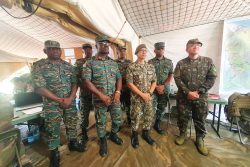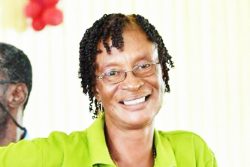The constitutional reform process, 1999-2000, and other measures spawned by the Herdmanston Accord, sought to bring to an end the 1997 post-election violence. President Janet Jagan resigned the Presidency due to ill-health and President Jagdeo assumed office in August, 1999. General elections were held in 2001 and the PPP was returned to office. After the third round of intense post-election violence in 2001, the Constitution was amended to implement the wide-ranging reforms, the vast majority of which were to introduce a system of cooperation and consultation. By 2002 the legislative process was complete and the constitutional and legislative bodies were being established.
The success of the work of the Constitution Reform Commission in 2000, gave hope that post-elections violence and political instability would recede. It did not. Opposition-inspired violence returned after the 2001 elections. When these came to an end, President Jagdeo pressed for talks with the PNC. He said after the elections in 2001: “It is critical that we engage one another in dialogue. We should always reach out and talk to each other. In this way, we would be fulfilling the mandate of all Guyanese as we share our differing views in the search for national consensus on the common objective of making this country a better place for all.”
Talks between Desmond Hoyte and Bharrat Jagdeo took place after peace returned and these words were uttered. Several teams comprising nominees of each side were established to discuss and produce proposals on: Local government reform; Border and National Security; Distribution of land and house lots; Resuscitation of the bauxite industry; Depressed communities’ needs; and Radio monopoly and non-partisan boards. The achievements of the dialogue were set out in detail in “Building Trust and Confidence,” a Government paper presented to a distinguished assemblage at State House in February, 2003. However, no further progress was made and after the reports were submitted, the discourse fizzled for no known reason. The parties returned to their old ways but not before Desmond Hoyte announced his conversion to ‘shared governance,’ a most significant development after his history of unremitting opposition to the PPP. He passed in December 2002.
Robert Corbin was elected acting Leader in December 2002 and Leader in February 2003. Corbin would have noted Jagdeo’s words read from the document: “The PPP/C believes that a conscious effort is required by the major political parties to build trust and establish confidence. Without such trust, suspicion will continue, motives will be questioned, policies will be judged on distorted criteria, resource allocation will always be followed by allegations of partisanship and agreements will be difficult to be arrived at…The PPP/C proposes the implementation of all the constitutional reforms as an immediate measure to building trust and to further enhance inclusive governance… These measures which are vital for our political development and the emergence of a new political culture characterized by greater trust, civility and commitment to the national interest… In an environment created by deepening trust and confidence, further arrangements for inclusive governance can result after consultation with our constituents and the electorate.”
These sentiments once again led to talks between the PPP and PNC. Dubbed “constructive engagement,” the leaders reviewed their May 6, 2003, Communique and June 18, 2003, Follow-Up Agreement, and agreed to a 16-point programme in September, 2003, which provided for wide-ranging measures relating to parliament, local government, state boards and commissions, office of Leader of the Opposition, electricity, regional issues and more. Five months later, the process ended in mutual recrimination with the Opposition’s accusation being that the PPP had not implemented agreed proposals.
The PPP held the heavier burden of responsibility to ensure success of these two attempts at talks because it had political power. President Jagdeo appeared to understand the PPP’s responsibility to engender unity and cooperation. He had said when he assumed office in 1999: “I extend a hand of friendship to those who are in opposition and invite them to sit with us and iron out differences so that we can have a common cause to serve – a cause in service to our people and nation”. (August 11, 1999).
According to President Jagdeo in “Building Trust and Confidence,” collaboration in establishing the constitutional mechanisms, and their functioning, were expected to generate a high degree of trust and confidence. This did not happen after 2003. Why? It could be argued that the criminal terrorism, with political overtones, between 2002 and 2008, was one factor. The second could be that the constitutional commissions never functioned optimally, or at all (the Human Rights Commission was never established), the parliamentary sectoral committees and select committees rarely meet and special select committees are hardly ever established to consider legislation. The third could be the fallout from the no confidence motion in 2018 and the attempt to rig the 2020 elections. The Opposition might want to add the rise of marginalization and discrimination. But just as the PPP and President Jagdeo were able to put political hysteria and post-election violence in the past and engage in discourses with the PNC between 2001 and 2003, the time has come to similarly treat with the current negative issues, and return to the vision that President Jagdeo outlined in 1999, 2001 and 2003.
(This column is reproduced with permission from Ralph Ramkarran’s blog, www.conversationstree.gy)










